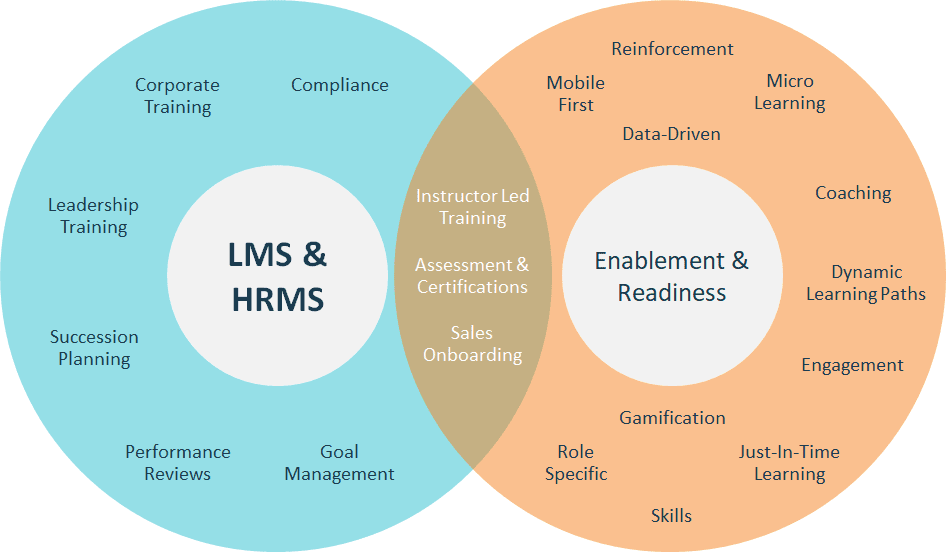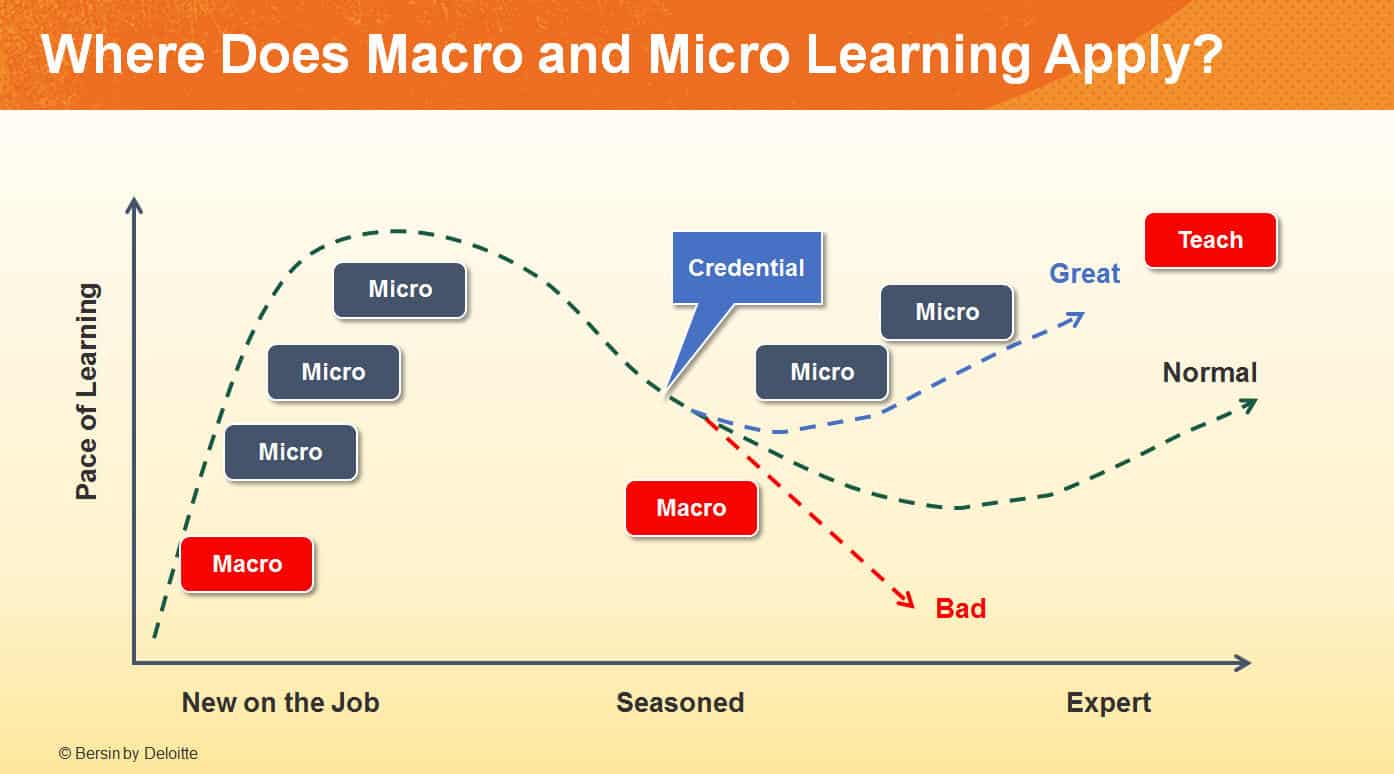We’ve entered a new era of sales training. For many decades, long presentations in classroom environments were the only form of career learning available. But today, sales reps expect more creative and comprehensive career development tools, and customers expect salespeople to be valuable industry experts.
As technology evolves, attention spans decrease and customer knowledge skyrockets. Sales instruction must now include new methodologies that didn’t exist even 10 years ago. Today’s training is fueled by sales enablement technologies, and it’s bolstered by innovative coaching methods.
What is Sales Training?
Sales training is the ongoing process of teaching sales teams how to create profitable, deal-closing interactions with buyers. This may include in-person learning, e-learning, micro-learning, gamification, or other training techniques to help salespeople improve.
Sales training is designed to help sales reps close more deals, of course. But it’s also about teaching reps to build long-term relationships with buyers and guide them to buying decisions that best benefit their organizations as well.
Although the terms are sometimes used synonymously, sales training is not the same as “sales enablement” or “sales coaching.”
Sales enablement is a wide umbrella. While it includes training, it also involves tools, content, processes, and other resources that enable sales reps to be at their best.
Sales coaching is a crucial reinforcer of training. It’s the continuous, one-on-one guidance given to salespeople to fill each individual rep’s specific knowledge gaps.
The Best Sales Training Techniques
There’s no single training plan that works for every sales organization, and it’s beneficial to use a mix of different methods to keep things interesting. There are, however, several training techniques that, when implemented correctly, boost the performance of sales teams. Here are key sales training techniques to consider:
E-learning
Technology and flexible work arrangements continue to change how and where work is performed.
Over 40% of U.S. employees worked remotely for at least part of the time in 2017, up from only 23% in 2003.
and salespeople are no exception. Even when employees are in the office, sales teams are often dispersed throughout different cities, states, and even countries to serve different markets.
Traditional, in-person training is challenging to coordinate, expensive to execute, and requires taking the sales staff away from valuable customer-facing activities for hours or days at a time.
E-learning can take different forms, such as instructor-led classes vs. massive open online courses (MOOCs). These are most commonly used to teach several new concepts in a short span of time, such as during sales rep onboarding or training on a new system.
E-learning eliminates many of the pitfalls of traditional sales training by providing:
- Anywhere/anytime access: By offering training courses online via the cloud, sales reps can access training materials wherever and whenever is convenient for them. The best e-learning technology also enables learners to take courses from any device, whether desktops, laptops, tablets or phones.
- Increased sales-rep productivity: The downtime required to travel to a conference center and sit through training would be better served on the front lines with buyers. Because e-learning enables salespeople to take courses whenever their schedules permit, they gain more time to focus on customer relationship building and revenue-generating activities.
- Cost reductions: Although e-learning requires up-front investment, it ultimately leads to steep cost reductions. Virtual learning reduces the costs of travel, training centers, physical learning materials (like training guides), and the expenses associated with bringing in dedicated trainers.
- Many engaging formats: E-learning can be as creative and engaging as you want it to be. And in our era of shrinking attention spans, engagement is important. The best e-learning training offers a mix of presentation formats that boost engagement. Examples include video, interactive infographics, whiteboard-style free animations, kinetic text, and challenging-yet-fun assessments to test the learner’s knowledge.
- Attractive perks for top talent: Companies with the most convenient and robust learning opportunities can win top talent better than competitors. Sales training offers career and skill development—something that millennials want and expect from their employers. A sales organization that offers 24/7 access to industry-leading training materials can highlight their commitment to ongoing improvement in the recruiting process.
Micro-learning

Micro-learning is the practice of offering bite-sized, always-accessible, individualized training content to employees. This practice uses small learning opportunities to reinforce key concepts and drive employee development.
Micro-learning is often focused on one topic or problem, and it is easily searchable so employees can find information on the right topic at the right time. Micro-learning may incorporate a range of content types, including quizzes, videos, games, simulations, audio clips, and more.
Micro-learning taps into a key principle of how humans learn: the more we repeat and use information, the more ingrained it becomes in long-term memory. Research also shows that information is retained more effectively when it is spread over a longer period of time, compared to when the information is presented all at once.
Not only does micro-learning aid in the learning process, but it also saves precious time and helps the learner absorb information in a way that’s fun and engaging.
Here are some important benefits of micro-learning:
- Retain more training information: Conventional e-learning typically covers numerous training objectives in one lengthy course. This can create “information overload,” causing reps to struggle to retain a wide range of concepts. Micro-learning flips this tactic on its head by presenting the learner with short-and-sweet training modules.
- Fit into busy reps’ schedules: Each training module is quick, fun, and engaging. It focuses on one learning objective, with one vital concept to remember, and then ends. The learner can then either take another training module or go about their day with that one newly-learned concept in mind.
- Identify knowledge gaps and track progress: Advanced micro-learning platforms provide the ability for sales leaders to identify reps’ knowledge gaps, assign training to fill that gap, and track the reps’ progress in that area.
- Customize and personalize training programs: With larger sales teams, there are numerous knowledge gaps to fill. Traditionally, the way to deal with knowledge gaps was to present dozens (or even hundreds) of reps with one lengthy training session in an attempt to cover every possible need. With micro-learning, sales coaches can assign the exact modules needed to fill every rep’s knowledge gaps. This approach boosts efficiency, saves time for the entire sales team, and gives reps a more customized approach to development.
- Provide information that is relevant here and now: Sales training should be refreshed frequently to accommodate the latest product knowledge, buyer insights, and industry trends. Traditional classroom materials or even e-learning can take months to update. Micro-learning modules, on the other hand, can be updated within hours to ensure reps are getting the most relevant information.
- Improve training completion rates: The longer and more challenging the training, the less likely your reps are to complete the entire program. With shorter, more approachable training that is easy to fit in with day-to-day activities, reps are more likely to start and complete their training modules.
- Gain a competitive advantage: Companies can gain and cement their competitive advantage by using micro-learning techniques. Dynamic learning opportunities like micro-learning improve the onboarding process, increase productivity, help attract and retain top talent, and require less time to find and update than traditional training materials. All of these benefits together help you build a competitive advantage and deliver more value to customers.
Gamification
Gamification provides something that was once unheard of: training programs that are fun. Training that’s enjoyable and engaging helps the learner retain more of the material for longer periods of time.
When training and assessments are enjoyable, reps are motivated to complete modules even when they’re not assigned to them. This provides for more training opportunities and more reinforcement of key concepts covered in e-learning, micro-learning, or other training formats. When salespeople are motivated to complete more training, the result is a more highly skilled sales team that is prepared to drive revenue growth.
Some of the most effective gamification elements include:
- Video-game components: Gaming is a familiar format to millennials, who make up the largest share of the U.S. workforce. The gaming format offers fun and engaging challenges to help apply and reinforce what is learned.
- Leaderboards: Leaderboards and badges add healthy colleague-to-colleague competition to the training mix. Since their achievements can be publicized company-wide, reps receive more recognition and motivation than they did with traditional training courses.
- Social elements: Newsfeeds and open communication between reps make the gamification experience even more rewarding. Social elements can promote new business connections and profitable interactions (like knowledge sharing and meaningful encouragement) within the sales force.
- Gamified quizzes: Even quizzes can be fun when they’re turned into games. When reps don’t pass an assessment on the first try, they’re more willing and motivated to play the learning game again to pick up the information they might have missed.
Real-world incentives
Salespeople are goal-driven and competitive by nature. Online training programs should leverage these traits. While many reps complete e-learning courses for their own career development, the right incentives can add motivational fuel to the fire. Here are a few important guidelines:
- Make sure the incentives are desirable: Incentives can take many forms, like spiffs awarded after meeting a challenging training goal, or gift cards or concert tickets. Anything that will motivate your reps is fair game. Don’t make the common mistake of assuming your team will be motivated by company-branded giveaway items like pens and sport bottles—your reps are more valuable than that, so it’s worth putting time and thought into your incentives.
- Incentives need to be achievable: If the incentive requirements aren’t attainable, such as earning 100% on all training quizzes for a month, reps will be discouraged rather than motivated. The requirements should be challenging, but reps need to believe they can actually win. Consider running “nearly impossible” incentives alongside achievable ones. For example, earning 85% or higher on all training quizzes this month will earn a standard (but desirable) reward, and landing 100% on all quizzes is worth an even more valuable reward.
- Get input from sales reps: With larger sales teams, especially when they’re remote, it might be harder to anticipate what kinds of incentives resonate well with your reps. If you’re not sure what to offer, ask reps directly. Consider emailing a questionnaire with a list of rewards to choose from, whether gift cards, a donation to their favorite charity, etc. Then, when a rep earns an incentive, you’ll know their preferences.
- Deliver the reward immediately: With remote sales reps, make sure the reward is mailed quickly. For reps working in the office, hand-deliver it the day it’s earned, if possible. To maintain the motivation, reps should see training incentives being received as promised.
How a Sales Training Platform Can Help
There are countless approaches to establishing effective sales training and onboarding at your organization. The right training platform can help your reps achieve quotas faster and improve new reps’ time to productivity. Look for a platform that enables you to:
- Identify your reps’ specific knowledge gaps
- Assign your reps the right learning paths based on their roles
- Track onboarding progress with milestones and certifications
- Provide training modules that incorporate gamification elements
Mindtickle is a trusted sales training platform that enables sales teams worldwide to become more competitive and profitable. Schedule a demo to see how Mindtickle can help you establish and refine your sales training program.



 By Helen Waite
By Helen Waite

 By Rahul Mathew
By Rahul Mathew